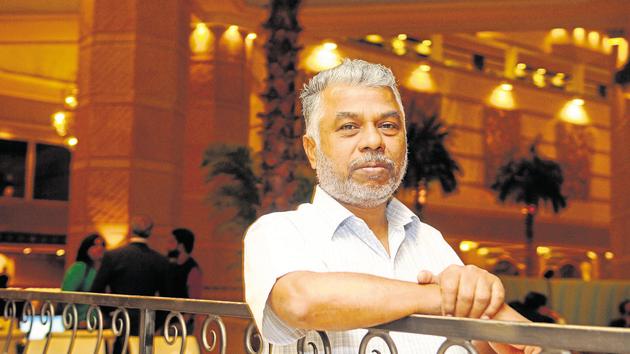‘Metaphor is my ticket to freedom’ says Tamil writer Perumal Murugan
Humble, shy and down-to-earth, Attur-based Tamil writer Perumal Murugan, 50, found himself in the eye of a storm two years ago for a novel One Part Woman that he was forced to withdraw from the market after threats and harassment from right wing supporters.
Humble, shy and down-to-earth, Attur-based Tamil writer Perumal Murugan, 50, found himself in the eye of a storm two years ago for a novel One Part Woman that he was forced to withdraw from the market after threats and harassment from right wing supporters. He declared the author in him as dead, until Madras high court upheld his freedom. On the sidelines of Kolkata Literary Meet (KaLaM), he told HT how he is now a changed writer.

PM: I will not speak anything about the controversy and that episode.
HT: Tell us how that episode changed you as a person and as a writer.
PM: (After a rather long pause) I surely have changed as a person but I am unable to put clearly in words exactly how I have changed. It will take more time. With regard to writing, my style has changed. My writing style was more of non-fiction, with a lot of anthropological details about place and people. I have quit that style of writing for fiction.
HT: Would you elaborate?
PM: I’m using metaphors. When I went to New Delhi to release my book of poetry (July 2016), the first book since my self-imposed exile, I had spoken about how I had been suffering from self-censorship. With metaphors, I no longer have to deal with any kind of self-censoring. I can write freely what I want to.
HT: So, metaphors gave you freedom from the complexities of reality?
PM: Metaphor has acted as the ticket to freedom. My latest novel is Punachi (Story of a Goat). The story is based on a goat, rather than people, because that seems to be the better option now.
HT: You had previously said that writing is your only vocation. Before these two years of self-imposed silence, what was the longest phase when you did not write?
PM: There was a phase of three to four years during the 1990s, when I was too busy with marriage and other family affairs, when I did not write anything. However, I was writing in my mind even if I did not put things in paper. Otherwise, as you said, writing has been my only vocation. Even during these two years of enforced silence, actually it was for the first three months that I remained completely blank. Then, I started writing poems.
HT: And then, in less than two years, you had a compilation of 200 poems. How frequently did you write poems before?
PM: I wrote those 200 poems in about one year and a half. Poetry gave me the greatest relief. It was the only outlet to respond to what I had been subjected to. I was sharing those poems within a very close circle though. Before that phase, I had penned about another 200 poems over the past 25 years.
HT: What impact the Madras high court ruling had on your writing?
It was ‘ruling of god’. Without that judgment, my book of poems would possibly have never been published. It gave me confidence, encouraged me to continue with my duty and helped me resurrect.
HT: Revised editions of nine of your previous novels were released earlier this month. Why did you revise those novels?
PM: I changed the names of places, people and their castes. This does not change the story, however.




